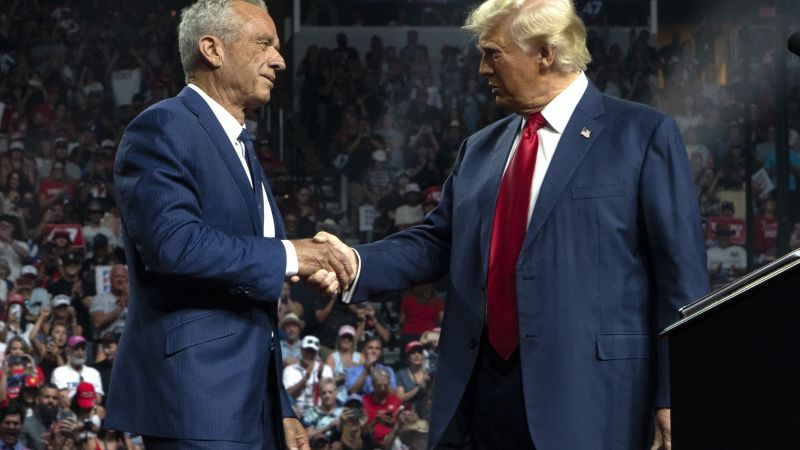The recent appointment of Robert F. Kennedy Jr. as Secretary of the U.S. Department of Health and Human Services (HHS) by former President Donald Trump has raised considerable alarm among public health experts and advocates. Dr. Ashish Jha, the dean of the Brown University School of Public Health, expressed strong reservations regarding this decision, labeling it an “extraordinarily bad choice for the health of the American people.” His comments reflect a burgeoning consensus among public health leaders who are apprehensive about Kennedy’s history of vaccine skepticism and his outspoken views on health and safety.
Adding to these concerns, Dr. Carlos del Rio from the Emory School of Medicine remarked that the selection of Kennedy represented a low point in public health policy, suggesting that the ramifications of this appointment could be dire. Indeed, Kennedy’s past as a vaccine skeptic raises questions about the potential impact on vaccination compliance and broader public health initiatives, particularly as it relates to infectious disease research and scientific integrity.
Trump’s justification for the selection draws on themes of governmental corruption and the need for reform within the health system. In a statement, he decried the influences of the industrial food complex and pharmaceutical companies on public health, emphasizing the need for HHS to protect Americans from harmful substances that have contributed to health crises. However, many public health advocates view Kennedy’s appointment as troubling, with Robert Weissman, co-president of the consumer advocacy group Public Citizen, insisting that Kennedy is a “clear and present danger to the nation’s health.” Weissman articulated a fear that this appointment echoes previous missteps during the COVID-19 pandemic when Trump’s public health policies were criticized for contributing to widespread illness and death.
The skepticism surrounding Kennedy’s potential policies is further underscored by Dr. Michael Osterholm from the University of Minnesota, who worries that the incoming Trump administration could yield devastating outcomes for public health. He voiced concern about the implications of Kennedy’s “pseudoscience” and the reorientation of public health priorities under his leadership. He called attention to the potential impacts on funding for science-based public health initiatives.
Interestingly, while there is widespread denunciation of Kennedy’s stance on vaccination, there are also acknowledgments that some of his ideas regarding food systems resonate with certain public health experts. In his inaugural statements following the appointment, Kennedy pledged to address “corporate capture” within public health agencies and vowed to eliminate corruption, declaring it a priority to promote evidence-based science in health policymaking.
Kennedy’s proposed initiatives include significant changes within HHS, aiming to dismantle what he views as the corrupt ties between industry and government, particularly with agencies such as the CDC and FDA. He has vocally criticized the FDA and articulated plans to dismantle several of its current operations surrounding drugs and dietary interventions deemed essential for public health. His views have led to controversies, especially claims regarding infectious diseases, as illustrated by Dr. Paul Offit, who expressed bewilderment at Kennedy’s desire to limit research in such critical areas.
Kennedy’s approach to vaccination raises alarms as he has propagated various unfounded claims linking vaccines with autism. Though he distanced himself from the “anti-vaccine” label, asserting a desire for transparency in vaccine safety, the trust of many public health professionals remains tenuous. The history of his statements lends little confidence that he will substantiate his claims with robust scientific evidence, leading critics to categorize his efforts as an “eleventh-hour attempt” at rebranding his public image.
Fluoride regulation emerged as a salient point within Kennedy’s proposed health agenda. He has stated that a second Trump administration would recommend eliminating fluoride from public water supplies, citing potential health hazards. His rhetoric hints at a broader agenda to mobilize public sentiment against established health practices, which both experts and public health agencies have long claimed to be beneficial.
In summation, while some of Kennedy’s suggested reforms may resonate with aspects of public health policy, the prevailing sentiment among experts is one of caution and concern. His past, characterized by skepticism towards vaccinations and the promotion of dubious health claims, casts a long shadow over his potential impacts on HHS and national health policy. As the debate around these issues continues, many remain vigilant, emphasizing the necessity of science and evidence-based decision-making in public health governance. With active critiques surfacing from health professionals across the spectrum, the future of U.S. public health under Kennedy’s influence is fraught with uncertainty.



